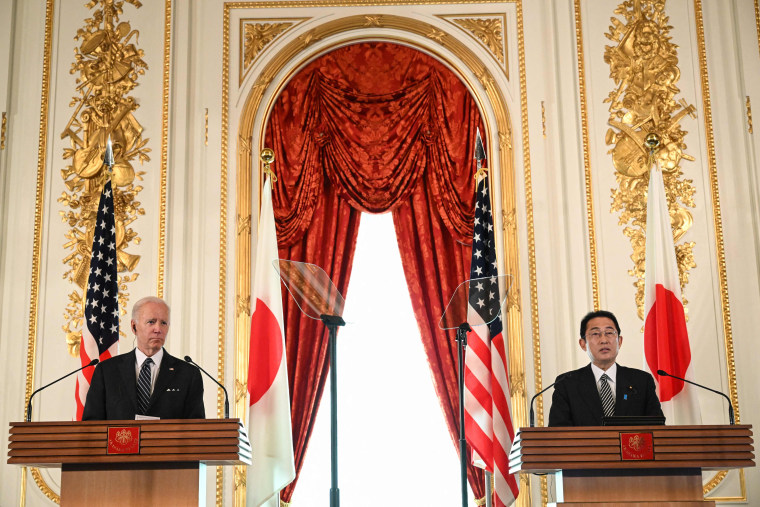President Joe Biden said Monday the U.S. would be willing to intervene militarily if China were to invade the self-governing island of Taiwan, again sowing confusion over U.S. policy in the region.
Biden said at a news conference in Tokyo alongside Japanese Prime Minister Fumio Kishida that Beijing was already “flirting with danger” with its recent military drills and other aggression toward Taiwan, which China views as its own territory.
The question came up in the context of Russia’s invasion of Ukraine.
“You didn’t want to get involved in the Ukraine conflict militarily for obvious reasons,” a reporter asked. “Are you willing to get involved militarily to defend Taiwan if it comes to that?”
“Yes,” Biden responded.
“That’s the commitment we made,” he added.
A White House official appeared to walk back the declaration that the U.S. could intervene militarily shortly afterward.
“As the President said, our policy has not changed. He reiterated our One China Policy and our commitment to peace and stability across the Taiwan Strait,” the official said in a statement. “He also reiterated our commitment under the Taiwan Relations Act to provide Taiwan with the military means to defend itself.”
Defense Secretary Lloyd Austin echoed the comments at a news conference Monday afternoon.
“Our One China Policy has not changed,” he said.
Chinese Foreign Ministry spokesperson Wang Wenbin expressed “strong dissatisfaction and firm opposition to the U.S.’s remarks” and warned Washington against supporting “Taiwan independence.”
“Taiwan is an inalienable part of China’s territory, and the Taiwan issue is purely China’s internal affairs, which brooks no interference from any external forces,” Wang said Monday, adding: “On issues concerning China’s core interests, such as sovereignty and territorial integrity, China has no room for compromise.”
“No one should underestimate the strong determination, firm will, and strong ability of the Chinese people to defend national sovereignty and territorial integrity," he said.
Taiwan's Foreign Affairs Ministry welcomed Biden's comments in a statement expressing "gratitude" to the president and the U.S. government for "reaffirming their rock-solid commitment to Taiwan."
Similar comments Biden has made about Taiwan have prompted confusion in the past.
While the U.S. is required by law to provide democratically governed Taiwan — which Beijing views as a breakaway region — with defensive weapons, a policy of “strategic ambiguity” has long made it unclear what exactly the U.S. would do if Taiwan were attacked.
Biden said at the news conference that Washington’s “policy toward Taiwan” had “not changed at all.”

Biden said the U.S. will continue to act in line with the One China policy, which recognizes Washington’s formal relationship with Beijing, but he added, “We remain committed to supporting the peace and stability across the Taiwan Strait and ensuring there’s no unilateral change to the status quo.”
Under the One China policy, the U.S. does not have official diplomatic relations with Taiwan, but it does maintain an unofficial embassy on the island.
Biden compared the Taiwan issue with the war in Ukraine, saying Russian President Vladimir Putin should “pay a dear price for his barbarism” long after the conflict there is resolved. If sanctions against Russia did not continue, he said, “then what signal does this send to China about the cost of attempting to take Taiwan by force?”
Recession inevitable?
Asked whether he believed a recession in the U.S. was inevitable, Biden responded with a simple “no.”
With the U.S. facing record inflation and supply shortages fueled by the conflict in Ukraine, Biden acknowledged that the U.S. had “problems that the rest of the world has.” However, he said, those issues were “less consequential than the rest of the world has.”
Biden said that the U.S. was in for “a haul” and that addressing supply shortages and high energy prices deepened by the war in Ukraine would “take some time.” However, he said he ultimately did not believe a recession was unavoidable in the U.S.
Asked whether the U.S. was considering lifting tariffs on Chinese imports to reduce the impact on domestic consumers and businesses, Biden said he was “considering it.”
“We did not impose any of those tariffs, and they’re under consideration,” he said.
Security Council membership
Kishida said that in an earlier meeting in Tokyo, Biden confirmed that the U.S. would support Japan’s becoming a permanent member of the U.N. Security Council as the two countries sought to deepen cooperation on security issues.
“The Pacific Ocean does not separate Japan and the United States,” Kishida said.
In a readout of the meeting, the White House said Biden met with Kishida to advance cooperation “on a range of bilateral, regional, and global issues.”
They committed to work closely together to address security challenges, including North Korea’s nuclear and ballistic missile programs, as well as China’s “increasingly coercive behavior that runs counter to international law,” the White House said.
They further agreed to deepen cooperation in a number of other areas, including emerging technologies, supply chain security and clean energy.
Later, Biden announced an economic agreement with a dozen other countries in the Indo-Pacific region to counter China’s influence in the region.
Along with the U.S., initial participants in the Indo-Pacific Economic Framework include major economies — like Australia, India, Japan and South Korea — as well as developing ones, including Indonesia, the Philippines, Malaysia, Thailand and Vietnam. They also include smaller countries, like Brunei, New Zealand and Singapore.
Together, they represent about 40 percent of global gross domestic product, administration officials said.

